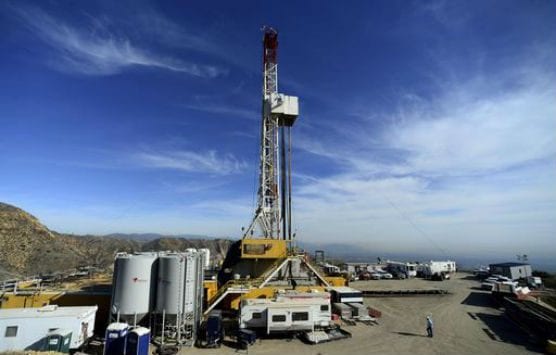By Maria Dinzeo
SAN FRANCISCO – A group of small businesses said that Southern California Gas Company should be held accountable for the ruinous losses they suffered in the wake of the most catastrophic gas leak in California history at the state Supreme Court Tuesday.
The California Supreme Court heard arguments in their class-action case, which has the potential to upend tort law and the concept of duty of care.
Attorney Leslie Brueckner, arguing for a class of small businesses operating within a five-mile radius of the 2015 Aliso Canyon methane gas blowout, said SoCal Gas deliberately failed to replace a safety valve at its storage field near Porter Ranch, triggering a leak that spewed methane into the atmosphere for months.
“SoCal knew its aging facility was on the brink of catastrophe,” Brueckner said.
The ruptured well was built in 1979, and replacing or repairing the valve would have cost the company relatively little, but Brueckner said SoCal prioritized profits over safety.
More than 100,000 tons of methane poured out from the Aliso Canyon natural gas storage site beginning in October 2015, prompting the evacuation of several nearby communities, including Porter Ranch in the northwest region of Los Angeles.
About 8,000 families were forced out of their homes, some for months, as the utility company worked to fix the gas well. The leak was finally capped in February 2016.
Before the leak was discovered, however, residents reported headaches, nose bleeds and other health issues.
Some 50,000 plaintiffs have sued the gas company for personal injury and property damage, but the Second Appellate District Court ruled in 2017 that seven businesses that suffered purely economic losses could not go after SoCal for damages. These businesses include a realtor, camera shop, a daycare center and a gas station.
“SoCal is asking the court to do something radical, which is to hold SoCal immune from any liability from economy losses,” Brueckner told the justices at Tuesday’s oral argument.
She urged the court to look at the case through the framework of Rowland v. Christian, another California Supreme Court case that established seven factors for determining the duty of care in negligence cases: the foreseeability of harm, the degree of certainty regarding the injury, the closeness of the connection between the conduct and the injury, moral blame, preventing future harm, the extent of the burden to the defendant and consequences to the community and the availability and cost of insurance to cover the risk.
“There should be an industry-by-industry analysis under Rowland,” Brueckner said.
But SoCal attorney Kathleen Sullivan said the court should apply the rule of no duty of care for purely economic losses for third parties.
“Rowland does not control everything in California tort law,” she said. “We’re not asking the court to do anything radical here. We’re just asking the court to apply 60 years of settled law.”
Sullivan said there was no special relationship between the business owners and SoCal Gas that would warrant an exception to the economic loss rule, as in an heir suing a notary for botching a will.
“But as a matter of social policy, if there’s no special relationship and purely economic loss, is there no application of tort law?” asked Justice Mariano-Florentino Cuellar.
Sullivan said the social policy would be to prevent “limitless liability,” or a slew of lawsuits from aggrieved people and businesses burdening the courts with a wave of indeterminate claims that will ultimately drive up insurance costs and ratepayers’ bills.
“It’s a harsh rule, you’ll probably admit,” Cuellar said.
“If you want to carve out classes, that would be the province of the Legislature. That’s not how this court operates,” Sullivan said, adding, “Yes, it is a harsh rule, but don’t take it from me. This doctrine is a rule, not a standard. You need to give certainty and predictability in tort law.”
Chief Justice Tani Cantil-Sakauye said holding SoCal liable could be a deterrent to future tragedies. “Does society have an interest in ensuring that businesses don’t cause disasters? Doesn’t this case cry out for an exception?”
“Respectfully, I would have to disagree,” Sullivan said. “The answer is not to create a new, unmanageable exception to the economic loss rule.”
Cantil-Sakauye said this was “cold comfort” to those who lost everything because of SoCal’s deliberate negligence.
“If businesses knew it could face downstream liability, it wouldn’t take that valve off,” she said.
Sullivan pointed to the 50,000 pending cases against SoCal as a deterrent, and that the seven businesses’ cases would add “no bang for the deterrent buck.”
On rebuttal, Brueckner said the economic loss rule “an extremely rigid, inflexible rule that’s unfair.”
“We’re not asking for an exception to the economic loss rule. We’re saying the economic loss rule doesn’t apply in this case,” she said.

Like this:
Like Loading...
Related





 Tweet This
Tweet This Facebook
Facebook Digg This
Digg This Bookmark
Bookmark Stumble
Stumble RSS
RSS



























REAL NAMES ONLY: All posters must use their real individual or business name. This applies equally to Twitter account holders who use a nickname.
1 Comment
When they opened the model homes for Porter Ranch, I toured them and could smell the gas. The gas smell was so bad that it made it hard for me to breathe even then. That is why I was not interested in buying in the area. I am surprised that others did not smell the gas. It was really bad around the largest homes near the hillside. This was way before the blowout.